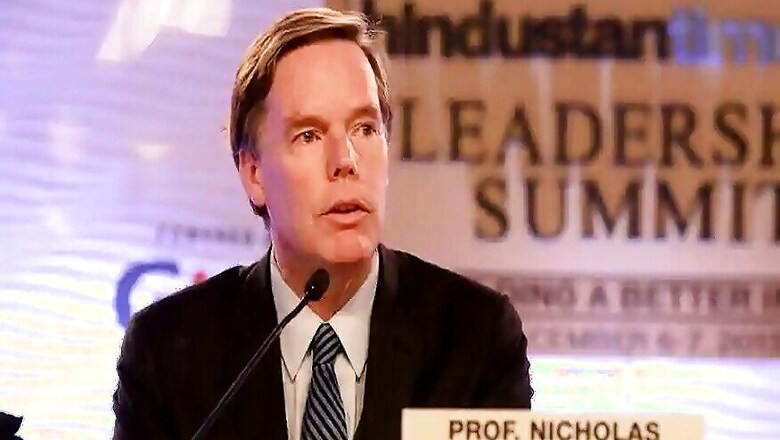
views
India and the US must work together to make the "authoritarian" China follow the rule of law, and it is a battle of ideas against the fearful Chinese leadership that has been suppressing voices of its own people, former US diplomat Nicholas Burns said on Friday in a video chat with Congress leader Rahul Gandhi.
On his part, the Congress leader said the DNA of openness and tolerance that India and the US were known for has "disappeared", and those creating divisions are now claiming to be nationalists.
Gandhi also said the bilateral ties between India and the US, which "used to be very broad", are now "episodic" and focused mainly on defence.
Burns, currently a professor at the Harvard University's John F Kennedy School of Government, said that both the countries need to fight the challenges posed by authoritarian countries like China and Russia, saying "we don't want war, but we want to preserve our way of life and we want to preserve our positions in the world".
"I think that India and the US can be working together. Not as you say not to fight China, but to make it observe the rule of law as we try to live together in this world," he told Gandhi.
Burns said what China lacks is the sophistication and openness of a democratic country like India or the United States.
"China has a fearful leadership. Fearful men trying to preserve their own power, increasing the grip that they have on their own citizens," he said, citing examples of what is happening in Xinxiang and Hong Kong and to the Uyghurs.
While expressing hope that India and the US will have a future, he said, "I worry the Chinese system is not going to be flexible enough to accommodate the desires of the Chinese people for human freedom and liberty."
He, however, said in America "you see race come back now", referring to protests over the death of African-American George Floyd in police custody.
"We have millions of Americans trying to protest peacefully, as is our right, as is your right in India, and yet the President treats them all like terrorists," he said.
Burns said the US and Indian governments should combine forces to promote human freedom, democracy and rule of people in the world.
"I think that is a powerful idea that Indians and Americans can bring together to the rest of the world. Again, you know, we are not looking for a conflict with China, but we are waging, in a way, a battle of ideas with China," Burns said.
In his remarks, Gandhi attacked the current dispensation saying an "atmosphere of fear" is prevailing in India with a "unilateral, episodic" leadership at the helm, which is proving to be "destructive".
The former Congress president said the Indo-US partnership works because being tolerant was in their DNA, but that level of tolerance, which was seen before, is not being seen now in both the countries.
"Our DNA is supposed to be tolerant. We're supposed to accept new ideas. We're supposed to be open, but the surprising thing is that DNA, that open DNA, is sort of disappeared. I mean, I say this with sadness that I don't see that level of tolerance that I used to see. I don't see it in the United States and I don't see it in India," Gandhi observed.
Gandhi has also been critical of the Narendra Modi government and has often accused the prime minister of being "dictatorial" and one who does not listen to the views of the opposition.
The Indo-US relationship, which used to be a partnership earlier, now seems to have become "very transactional" and "episodic", the Congress leader said.
"A relationship that used to be very broad -- education, defence, healthcare, multiple fronts -- has sort of focused down mainly on defence," Gandhi said.
Burns, the former US under-secretary of State and the chief negotiator of the India-US nuclear deal under the Bush administration, said not just the governments of the US and India, but their societies were very closely intertwined and that is a great strength.
"If you think that one of the challenges we face is the coming power of authoritarian countries. I mentioned two before, China and Russia. We never want to fight, we don't want war but we want to preserve our way of life and we want to preserve our positions in the world," he said.
The former US diplomat also called for keeping the doors open for each other, lower restrictions on the movement of peoples between the two countries.
He said a lot of university students and high-tech Indian business people come to the United States on H-1B visas. "They've been severely limited in recent years. We simply don't have enough engineers in the United States to run our economy and India can supply many of those engineers. I keep the barriers low," he added.
At a time when the world is fighting the COVID pandemic, Burns wished countries leave their differences behind and worked together for a vaccine or how to distribute that vaccine in an equitable and humane fashion. "But, that hasn't happened."
"I hope when the next crisis comes, will do better to work together in a more effective way," he said.
During the conversation, Gandhi also hit out at the divisions prevailing in both the countries, saying they weaken nations.
"When you divide African Americans, Mexicans and other people in the United States, so you divide Hindus and Muslims and Sikhs in India, you're weakening the structure of the country. But then the same people who weaken the structure of the country say they are the nationalists," he said.















Comments
0 comment